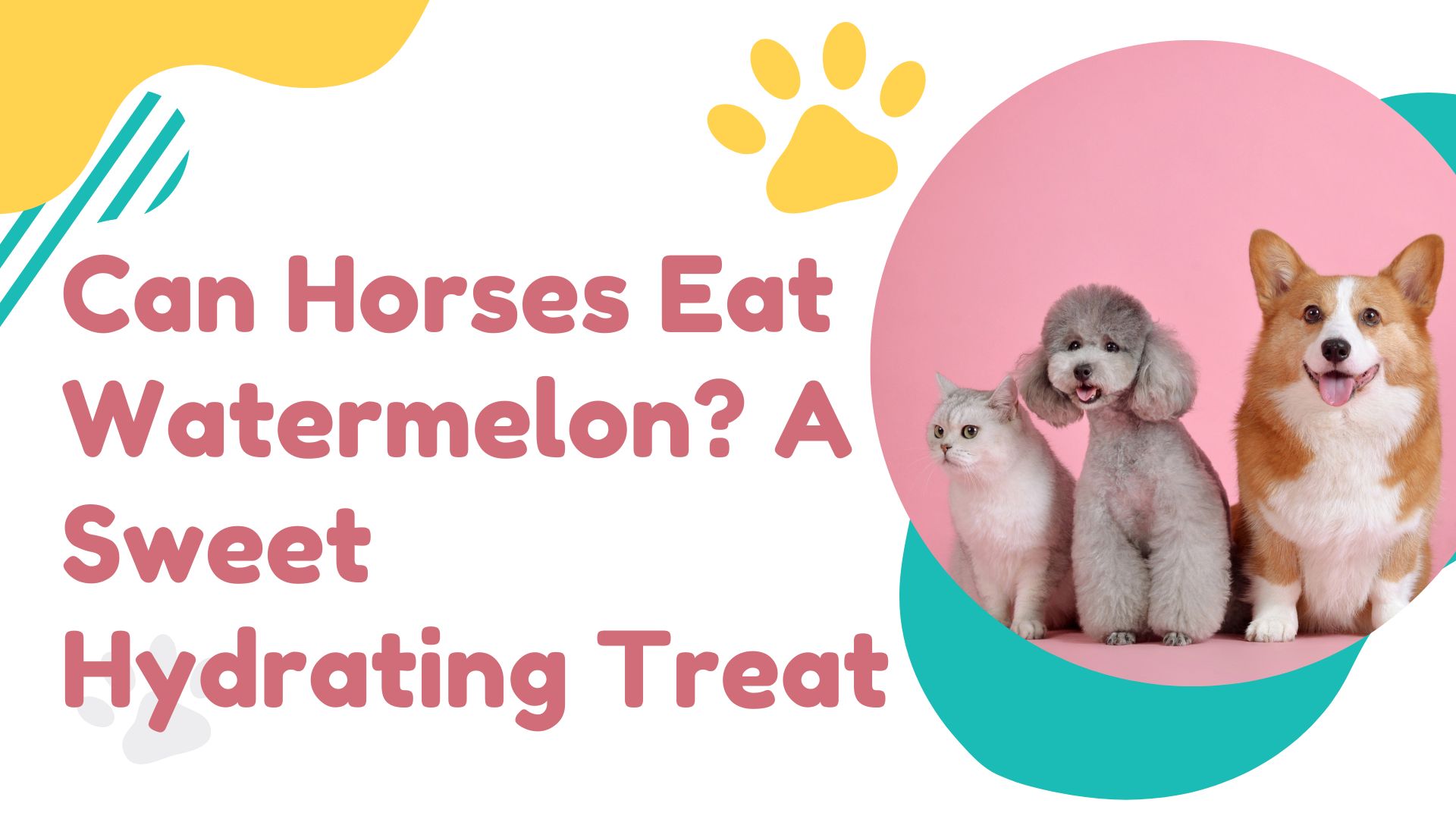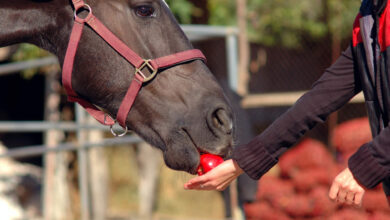
Many horse owners look for ways to cool down and hydrate their equine companions in the hot summer months. One popular treat is juicy, sweet watermelon. The refreshing fruit can be a tasty and nutritious snack for horses if fed properly and in moderation.
So, to answer the question, can horses eat watermelon? The answer is yes.
- Watermelon is not toxic or poisonous to horses.
- It contains high amounts of natural sugars, so moderation is key.
- Too much watermelon can cause digestive upset or diarrhea.

Watermelon is made up of over 90% water, making it great for hydration. It also contains beneficial vitamins and antioxidants:
- Vitamin A for immune health and vision
- Vitamin C for collagen formation and absorption of nutrients
- Lycopene is a powerful antioxidant
- Potassium for muscle and nerve function
- Low in fat and calories
Can Horses Eat Watermelon?
According to equine nutritionist Sarah Gold of Equine Diet & Nutrition, “Watermelon can be a healthy treat for horses as part of a balanced diet. The juice provides hydration while the flesh provides antioxidants like lycopene from the pigment that gives watermelon its red color. It’s best to feed watermelon in moderation since the sugars can cause gastrointestinal upset if horses consume too much.”
Read More: Can Horses Eat Pumpkin?
Tips to Keep in Mind While Feeding Watermelon to Horses
When feeding watermelon:
- Remove the rind first, as it can be difficult to digest
- Scoop out the seeds, which could cause choking
- Chop the watermelon into bite-sized pieces for easy eating
- Limit treats like watermelon to 10% of your horse’s daily intake
- Introduce new treats slowly while monitoring for reactions
Horses should not have more than 2 cups of watermelon per day. The high sugar and water content makes it easy to overconsume.
Monitor your horse’s manure for consistency when first adding watermelon. Stop feeding it if you notice loose stool or diarrhea.
Safety Precautions to Keep in Mind While Feeding Watermelon to Horses
Watermelon safety tips:
- Provide plenty of fresh, clean water at all times
- Check for signs of dehydration like lethargy or dry mouth
- Avoid feeding watermelon right before or after strenuous exercise
- Don’t feed when transporting horses or changing their environment
While watermelon makes a refreshing treat, you can also try other hydrating fruits like cantaloupe, honeydew melon, oranges, apples, or berries.
Leafy greens are over 90% water and provide added nutrition.
Check with your vet before making any major dietary changes if your horse has chronic health conditions.
Tips for Safely Feeding Watermelon to Horses
Watermelon can be a tasty and nutritious snack for horses when fed properly. Here are some tips for serving watermelon safely:
- Remove the rind first, as it can be difficult to digest
- Scoop out the seeds, which could cause choking
- Chop into bite-sized pieces for easy eating
- Mash or blend for older horses with poor teeth
Watermelon should always be fed in moderation:
- Limit treats to 10% of your horse’s total daily intake
- Feed no more than 2 cups of watermelon at a time
Surprising benefits of watermelon for horses:
According to UC Davis Veterinary Medicine, “The nutrients in watermelon, including lycopene and vitamin C, may help relieve muscle soreness and joint pain, especially when fed after exercise.” The juice can help horses rehydrate after strenuous activity.
When introducing watermelon:
- Start with a small amount like 1/2 cup
- Gradually increase over a few days if no reactions
- Closely monitor your horse’s manure
- Stop feeding if you notice loose stool or diarrhea
Watermelon safety:
- Avoid around dietary changes or medications
- Don’t feed right before transporting your horse
- Be cautious of pesticides if cut watermelon
- Always provide plenty of fresh water
You can also mix watermelon pieces into your horse’s normal food or use as a reward during training sessions. Just be sure to space out treats so as not to exceed daily limits. Check with your vet before feeding watermelon if your horse has chronic digestive issues.
Creative Watermelon Recipes and Myths About Feeding Horses
Watermelon can be incorporated into a horse’s diet in creative ways beyond just a plain sliced treat. Here are some recipe ideas to try:
- Fruit salad mixes – combine watermelon with apple, carrots, berries
- Frozen popsicles – blend and freeze into tasty, cooling treats
- Add watermelon pieces into their normal feed
- Use as a training reward spaced out during sessions
When serving watermelon:
- Mash or blend for horses with dental issues
- Mix with hay to slow fast consumption
- Offer after exercise when the horse is cooling down
Watermelon feeding myths vs facts
- Myth: Watermelon is toxic to horses. Fact: Watermelon is non-toxic and safe if fed properly.
- Myth: Horses can eat unlimited amounts of watermelon. Fact: No more than 2 cups a day to avoid digestive upset.
- Myth: The seeds are safe for horses to eat. Fact: Seeds should be removed as they pose a choking hazard.
- Myth: Watermelon should be fed daily. Fact: Watermelon should be an occasional treat due to the high sugar content.
- Myth: The rind is safe for horses. Fact: The rind is difficult to digest and should be removed.
No matter how you serve it, watermelon should only be 10% of your horse’s total daily feed.
Provide plenty of fresh water, especially on hot summer days when cooling foods like watermelon are ideal treats.
Monitor your horse’s manure consistency and overall health when making dietary changes. Check with your vet if you have any concerns over treats, medications, or chronic conditions.



